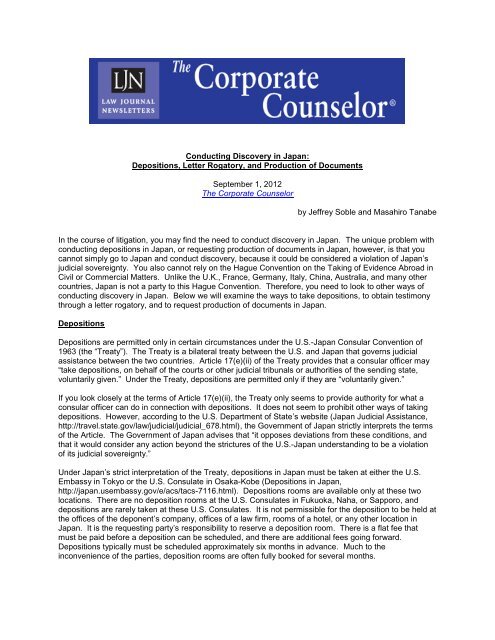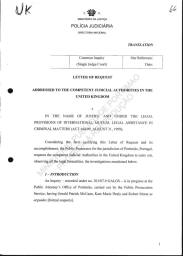The Role of Letters Rogatory in Criminal Investigations Across Borders
Wiki Article
Letters Rogatory Explained: Facilitating Legal Collaboration In Between Countries

Interpretation of Letters Rogatory
Letters rogatory are formal requests made by a court in one territory to a court in an additional territory, looking for assistance in acquiring proof or statement for a lawful proceeding. This procedural device is important in the context of worldwide regulation, where legal systems might vary, and cross-border teamwork is needed. Letters rogatory promote the celebration of information that might be crucial for adjudicating cases, particularly in circumstances including intricate multinational issues.Commonly, these demands arise in civil, criminal, or administrative issues where an event calls for proof that lies outside the territory of the requesting court. The letters function as a means to make certain that the principles of due procedure are maintained, making it possible for courts to gain access to proof that might or else continue to be inaccessible due to legal or geographical barriers.
Making use of letters rogatory is regulated by global treaties, bilateral contracts, or residential laws, which define the treatments and commitments of the courts entailed. It is essential to keep in mind that the execution of such requests is not ensured; they depend upon the laws and techniques of the territory getting the letter. Therefore, letters rogatory are a crucial tool for fostering lawful collaboration and making certain justice throughout borders.
The Refine of Issuing Letters Rogatory
Issuing letters rogatory includes an organized process that makes sure compliance with both worldwide and residential lawful standards. The requesting event, typically a court or legal authority, drafts a formal demand describing the nature of the help sought, the proof or details needed, and the legal basis for the demand. This document needs to be specific to assist in understanding by the international territory.
The following step involves transmitting the letters rogatory to the designated foreign authority. This is typically done via polite channels or global lawful aid structures, ensuring that the demand is received and recognized by the international court. The foreign court then refines the request according to its own lawful procedures, inevitably replying to the requesting party with the sought-after information or evidence, hence assisting in international lawful teamwork.
Significance in International Law
The relevance of letters rogatory in global regulation can not be overstated, as they serve as a vital mechanism for judicial teamwork throughout borders. These formal ask for help in legal matters permit courts in one jurisdiction to look for info, evidence, or the existence of witnesses from one more territory, thereby helping with the administration of justice in global instances.Letters rogatory are especially important in the context of globalization, where legal disagreements usually cover numerous countries. They make it possible for the collection of evidence that could or else be unattainable, guaranteeing that legal procedures are educated and reasonable. By cultivating partnership between judicial systems, letters rogatory help maintain the regulation of legislation and promote shared respect amongst nations.
In addition, using letters rogatory shows a commitment to global norms and principles of cooperation, mirroring the interconnected nature of modern legal methods. It shows the importance of sticking to well established treatments and treaties, such as the Hague Convention, which gives a structure for these demands - Letters rogatory. Ultimately, letters rogatory enhance the efficiency of legal processes, guaranteeing that justice is not prevented by geographical limits
Difficulties and Limitations
Despite their value, letters rogatory face several challenges and limitations that can hamper their performance. One main issue is the differing legal frameworks and treatments across jurisdictions, which can bring about misunderstandings and delays in the implementation of demands. Various nations might have unique requirements for the legitimacy of letters rogatory, complicating the procedure further.Additionally, the typically protracted nature of worldwide lawful collaboration can prevent timely accessibility to evidence or witnesses. This hold-up may negatively influence legal procedures or recurring examinations, especially in instances needing urgent activity. The lack of sources and training in some jurisdictions can result in inadequate handling of requests, leading to incomplete check it out or poor feedbacks.
Cultural distinctions and varying perspectives in the direction of lawful procedures can additionally pose significant barriers. For example, countries with much less formal lawful systems might have a hard time to comply with the procedural rigor expected in letters rogatory. Last but not least, political stress in between nations can influence the willingness to implement demands, resulting in a lack of teamwork and reducing the utility of this system in international law. These obstacles require constant dialogue and reform to improve the effectiveness of letters rogatory in lawful cooperation.
Case Research Studies and Instances

On the other hand, obstacles can arise, as seen in an instance involving a European country seeking proof in a continuous criminal issue from a non-EU nation - Letters rogatory. The process was postponed due to bureaucratic hurdles and differing legal standards, eventually impeding the examination
These instances show that while letters rogatory can promote international teamwork and expedite legal procedures, they also highlight the requirement for clear interaction and understanding of lawful frameworks between nations. Such study highlight the significance of refining this tool to enhance effectiveness and performance in international legal issues.
Verdict
In summary, letters rogatory work as a vital system for assisting in lawful teamwork between nations, guaranteeing the collection of proof and testament across territories. Their value in worldwide regulation can not be overemphasized, as they promote due process and boost the efficiency of cross-border lawful proceedings. Nevertheless, obstacles such as differing political stress and lawful frameworks might impede their performance. Proceeded efforts to boost the process and streamline are vital for fostering more powerful global judicial cooperation.Letters rogatory are official requests made by a court in one jurisdiction to a court in an additional jurisdiction, seeking support in acquiring evidence or testament for a legal case. The requesting party, typically a court or legal authority, composes a formal request detailing the nature of the aid sought, the evidence or information needed, and the legal basis for the request. The foreign court after that refines the request according to its own lawful procedures, ultimately reacting to the requesting site link event with the desired info or evidence, therefore helping with international legal collaboration.
In addition, the use of letters rogatory shows a commitment to worldwide standards and concepts of cooperation, mirroring the interconnected nature of modern-day lawful techniques.Worldwide legal teamwork with letters rogatory is navigate to this site not without its real-world effects, as shown by numerous case research studies that highlight both successes and obstacles.
Report this wiki page